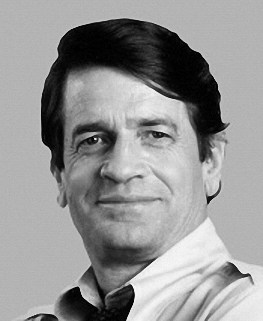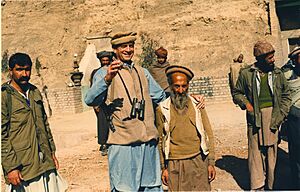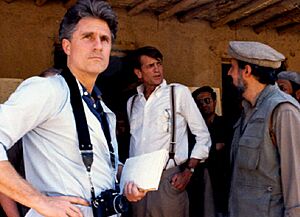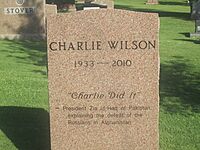Charlie Wilson (Texas politician) facts for kids
Quick facts for kids
Charlie Wilson
|
|
|---|---|

Wilson c. 1995
|
|
| Member of the U.S. House of Representatives from Texas's 2nd district |
|
| In office January 3, 1973 – October 8, 1996 |
|
| Preceded by | John Dowdy |
| Succeeded by | Jim Turner |
| Member of the Texas Senate from the 3rd district |
|
| In office January 10, 1967 – January 3, 1973 |
|
| Preceded by | Martin Dies Jr. |
| Succeeded by | Don Adams |
| Member of the Texas House of Representatives |
|
| In office January 8, 1963 – January 10, 1967 |
|
| Preceded by | Steve Burgess |
| Succeeded by | David W. Crews |
| Constituency | 6th district |
| In office January 10, 1961 – January 8, 1963 |
|
| Preceded by | William D. Winston |
| Succeeded by | David W. Crews |
| Constituency | 18th district |
| Personal details | |
| Born |
Charles Nesbitt Wilson
June 1, 1933 Trinity, Texas, U.S. |
| Died | February 10, 2010 (aged 76) Lufkin, Texas, U.S. |
| Resting place | Arlington National Cemetery, Arlington County, Virginia, U.S. |
| Political party | Democratic |
| Spouses |
Jerry Carter
(m. 1973; div. 1983)Barbara Alberstadt
(m. 1999) |
| Alma mater | United States Naval Academy (BS) |
| Occupation |
|
| Military service | |
| Allegiance | |
| Branch/service | |
| Years of service | 1956–1960 |
| Rank | |
Charles Nesbitt Wilson (June 1, 1933 – February 10, 2010) was an American politician and a naval officer. He served as a Representative for Texas for 12 terms. Wilson is widely known for his important role in supporting Operation Cyclone. This was a large, secret operation by the Central Intelligence Agency (CIA). It provided military equipment to the Afghan Mujahideen during the Soviet–Afghan War.
His efforts behind the scenes were featured in a non-fiction book called Charlie Wilson's War: The Extraordinary Story of the Largest Covert Operation in History. Later, a film named Charlie Wilson's War was made about his story.
Contents
Wilson was born on June 1, 1933, in Trinity, Texas. His father, Charles Edwin Wilson, was an accountant. His mother, Wilmuth Wilson, was a florist. He also had a sister named Sharon.
He went to public schools in Trinity. After graduating from Trinity High School in 1951, he attended Sam Houston State University. Later, he was accepted into the United States Naval Academy in Annapolis, Maryland. Wilson graduated from the Naval Academy in 1956. He earned a degree in Engineering, focusing on electronics.
From 1956 to 1960, Wilson served in the United States Navy. He became a Lieutenant. He worked as a Gunnery Officer on the USS John W. Weeks (DD-701). He was also stationed at the Pentagon. There, he was part of a unit that studied the Soviet Union's nuclear power.
First Steps in Politics
From a young age, Wilson was very interested in national security and world events. Growing up during World War II made him love reading military history. He especially admired Winston Churchill. This early interest in patriotism and international affairs led him to get involved in politics later on.
Wilson first got into politics as a teenager. He helped defeat a local city council member. This person had harmed Wilson's dog. After this, Wilson helped many people vote against the council member. He told them what had happened to his dog. The council member lost by a small number of votes. Wilson said this moment made him "fall in love with America."
While working at the Pentagon, Wilson volunteered for John F. Kennedy's 1960 presidential campaign. He took time off from the Navy to run for state representative in Texas. This was against Navy rules for active-duty members. In 1961, at age 27, he was sworn into office in Austin, Texas.
Wilson served in the Texas legislature for 12 years. He spent six years in the Texas House of Representatives and six in the Texas Senate. During this time, he worked on many important issues. He supported rules for utilities, fought for Medicaid, and pushed for tax breaks for older people. He also supported the Equal Rights Amendment and tried to raise the state's minimum wage. These actions earned him a reputation as a "liberal from Lufkin."
Congressional Career
In 1972, Wilson was elected to the United States House of Representatives. He represented Texas's 2nd congressional district. He started his new job in January 1973. He was re-elected 11 times. Wilson truly enjoyed his work and always aimed to "take care of the home folks." He resigned from his position on October 8, 1996. While he was strong on foreign policy, he was more liberal on other issues. These included women's rights and social security.
As a new representative, Wilson helped make the Big Thicket in Southeast Texas a National Preserve in 1974. This early success showed his political skill. He quickly earned a spot on the United States House Committee on Appropriations. His colleagues saw him as a great negotiator. He was known for his ability to trade votes with other members of Congress. This helped him pass the bills he cared about.
Wilson built a strong relationship with Israel throughout his time in Congress. This started during his first year in Washington when the Yom Kippur War happened. Wilson always supported the "underdog." He quickly became a strong supporter of Israel. While on the appropriations committee, he helped increase U.S. aid to Israel to $3 billion each year. Later, his close ties with Israel helped him work with Israeli engineers. They created and sent anti-aircraft guns to Pakistan. These guns were used in the Soviet–Afghan War.
For domestic policy, Wilson strongly supported individual rights. He especially championed the rights of women and minorities. He constantly fought against voting discrimination for African Americans. Women and African Americans were two of his biggest groups of supporters. In 1974, he worked with the League of Women Voters to pass the Safe Drinking Water Act.
Wilson also broke tradition by hiring many female staffers. His office was full of women who worked very hard. They were often called "Charlie's Angels." They handled problems for people in his district. This made sure his constituents received help and support. Wilson insisted that his staff should be respected for their hard work.
Wilson worked to improve the lives of Americans, especially those who were struggling. He fought against business interests to keep the minimum wage at $3.35 per hour. He also worked to increase funding for Medicare and Medicaid. These programs help the elderly, the less fortunate, and veterans. He also secured funding to open a Veterans Affairs Hospital in Lufkin, Texas. Wilson was a strong supporter of the right to own firearms.
Wilson's skill in negotiating helped him achieve many things. He was appointed to the United States House Committee on Ethics in 1980. He also gained a spot on the Kennedy Center Board of Trustees. He also got a position on the House Defense Appropriations subcommittee. This allowed him to direct money to support efforts against the Soviets in Afghanistan.
Supporting Afghanistan
In 1980, Wilson read a news report about Afghan refugees fleeing Soviet-occupied Afghanistan. The Soviet Union had sent troops to help the communist government in Afghanistan. They wanted to stop resistance from the Afghan mujahideen. Wilson called the staff of the United States House Committee on Appropriations. He asked for more money for Afghanistan. Since he was on the committee that funded CIA operations, his request was approved.
Wilson continued to increase the CIA's budget for its Afghan operation. In 1983, he secured an extra $40 million. $17 million of this was for anti-aircraft weapons to shoot down Soviet helicopters. The next year, a CIA officer named Gust Avrakotos directly asked Wilson for $50 million more. Wilson agreed and convinced Congress. He said, "The U.S. had nothing whatsoever to do with these people's decision to fight ... but we'll be damned by history if we let them fight with stones." Later, Wilson managed to give the Afghans $300 million of unused Pentagon money. This shows how much Wilson influenced U.S. support for the Afghan mujahideen. Wilson said the secret operation worked because "there was no partisanship or damaging leaks."

Joanne Herring also helped the Afghan fighters get support and military equipment. She convinced Wilson to visit Pakistani leaders. After meeting them, he was taken to a large Afghan refugee camp in Pakistan. He saw for himself the terrible things the Soviets were doing to the Afghan people. Wilson later said that seeing children with their hands blown off by mines was a powerful moment. It made him determined to help the Afghans as long as he was in Congress.
For his efforts, Wilson received the Honored Colleague Award from the CIA. He was the first civilian to get this award. However, Wilson's role is still debated. This is because much of the aid went to a hardline Islamist leader named Gulbuddin Hekmatyar. He has been accused of serious war crimes.
When the Soviet Union decided to leave Afghanistan, Wilson praised their leaders. He also supported U.S. involvement in the Bosnian War. After visiting former Yugoslavia in 1993, he urged the Clinton administration to lift the arms embargo on Bosnia. He said, "This is good versus evil."
During one visit to Afghanistan, Charlie Wilson met Jalaluddin Haqqani. Wilson wanted to fire a Stinger missile at a Soviet helicopter. They tried to attract helicopters by dragging chains and tires to create dust. However, no Soviet helicopters appeared, so Wilson could not fire a missile.
Retirement and Legacy
Wilson decided not to run for re-election in 1996. He then became a lobbyist for Pakistan. Later, he retired to Lufkin, Texas. He donated his official papers from Congress to Stephen F. Austin State University. In 1999, he married Barbara Alberstadt, his second wife.
In 2007, Wilson received a heart transplant. He continued to follow events in Afghanistan and Pakistan. In July 2009, the University of Texas System created the Charles N. Wilson Chair in Pakistan Studies. This encourages research into Pakistan's importance, culture, history, and literature.
Death
Charlie Wilson passed away on February 10, 2010, at age 76. He died in Lufkin, Texas, after collapsing. He suffered from cardiopulmonary arrest. Robert Gates, who was the U.S. Secretary of Defense at the time, said, "America has lost an extraordinary patriot whose life showed that one brave and determined person can alter the course of history."
Wilson received a graveside service with full military honors at Arlington National Cemetery on February 23, 2010. A jazz band played some of his favorite songs, like "As Time Goes By" and "My Way". They also played "Anchors Aweigh" and "Navy Hymn" to honor his time in the Navy.
John Wing, who worked closely with Wilson on global issues, said that Wilson would be missed for his kindness and willingness to help. Many people attended his service, including politicians and friends. At his home, a plaque displayed a quote from Abdur Rahman Khan, an Afghan leader: "My spirit will remain in Afghanistan even though my soul will go to God. My last words to you my son and successor are: Never Trust the Russians."
See also
 In Spanish: Charles Wilson (político) para niños
In Spanish: Charles Wilson (político) para niños
- Michael G. Vickers
- Special Activities Division
 | Leon Lynch |
 | Milton P. Webster |
 | Ferdinand Smith |



